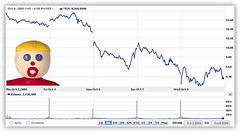 Most people think that the stock market is a dangerous game. They often hear stories of people who lost money in the stock market. The statistics of the stock market is by the end of bull bear cycle, 85% will lose money. That includes the government that gets all the taxes, the broker’s fee and the company that issued the shares. These are the winners. All speculators and traders who don’t understand the psychology of the market by the end of the day when the market collapse, 85% will lose money.
Most people think that the stock market is a dangerous game. They often hear stories of people who lost money in the stock market. The statistics of the stock market is by the end of bull bear cycle, 85% will lose money. That includes the government that gets all the taxes, the broker’s fee and the company that issued the shares. These are the winners. All speculators and traders who don’t understand the psychology of the market by the end of the day when the market collapse, 85% will lose money.Most people are scared when the market collapse which is very normal. My second and third stocks that I sold earned a paltry 200 pesos. I bought them for 20,000 and sold them for 20,200 because I got scared that it will go all the way down. With that experience, I deepened my understanding on the psychology of the stock market. I think it’s a process that most investors had to go through. Successful persons have failed considerably than the average ones. I have failed a lot of times and most of the time I almost wanted to give up. But then I keep on and then one day, the breakthrough will come.
My mentor Bo said that when there is blood, don't be afraid. Just keep on putting your 500 dirhams every month. When you are planning for your future, and you design a program already, you shouldn’t be afraid. When the stocks are down, I‘m happy because my 500 dirhams can buy more shares and when the stocks are up, it’s gonna multiply. When you received your dividends, reinvest it in the stock market, the compounding effect is there.
 First time investors like me are encouraged to look to invest in the stock market on a much longer perspective. We can use the peso cost averaging. If you invest 500 dirhams a month for your retirement, or your children’s education, or you want to build your dream house, you just need to buy companies that pay good dividends. The biggest problem here is the discipline. Would you be able to continue saving 500 dirhams every month? In pension plans, insurance, etc, if you missed payments you will lose the principal. In stocks there is no threat in losing the principal but the threat there is you might not have the discipline to do it consistently which is really required so that it can work. The drawback of not doing it consistently is when the price goes down; you might lose that opportunity to buy more shares.
First time investors like me are encouraged to look to invest in the stock market on a much longer perspective. We can use the peso cost averaging. If you invest 500 dirhams a month for your retirement, or your children’s education, or you want to build your dream house, you just need to buy companies that pay good dividends. The biggest problem here is the discipline. Would you be able to continue saving 500 dirhams every month? In pension plans, insurance, etc, if you missed payments you will lose the principal. In stocks there is no threat in losing the principal but the threat there is you might not have the discipline to do it consistently which is really required so that it can work. The drawback of not doing it consistently is when the price goes down; you might lose that opportunity to buy more shares. Then if you have some time, and extra cash and you want to learn the psychology of the market, then please do so. There are a lot of sources that will teach you how to time the market. Basically there are two kinds of people who plays the stock market, the long-term investor or value investor who puts money every month whether the stock market is up or down. The second type is the trader or the active investor who times the market. He buys when it’s low and sells when it’s high in bottoming market.
 When a baby is born, normally the father opens a bank account but there this one father who instead of opening a bank account he opened a stockbroker account. He bought PLDT shares every month in small amounts to spend for her child’s tuition fee when she grows up. After 15 years, the money is more than enough to cover the tuition fees. There are a lot of good companies that analyst have summarized that will last for the next 20 years, 50 years or 100 years. Examples are Jollibee, Ayala Land, PLDT, SM Prime, Manila Water Company, and BPI.
When a baby is born, normally the father opens a bank account but there this one father who instead of opening a bank account he opened a stockbroker account. He bought PLDT shares every month in small amounts to spend for her child’s tuition fee when she grows up. After 15 years, the money is more than enough to cover the tuition fees. There are a lot of good companies that analyst have summarized that will last for the next 20 years, 50 years or 100 years. Examples are Jollibee, Ayala Land, PLDT, SM Prime, Manila Water Company, and BPI.Disclaimer:
Investing involves substantial risk. I do not make any guarantee or other promise as to any results that may be obtained from using this blog. No reader should make any investment decision without first consulting his or her own personal financial advisor and conducting his or her own research and due diligence, including carefully reviewing the prospectus and other public filings of the issuer. To the maximum extent permitted by law, I disclaim any and all liability in the event any information, commentary, analysis, opinions, advice and/or recommendations in this blog prove to be inaccurate, incomplete or unreliable, or result in any investment or other losses.
No comments:
Post a Comment